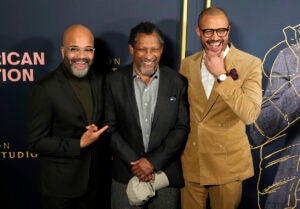
American Fiction — based on Percival Everett’s 2001 novel Erasure, is considered by many to be the front-runner in the adapted screenplay category. (Photo/John Davis, Windham-Campbell Prizes)
USC Dornsife Distinguished Professor Percival Everett is ready for Hollywood’s big night
He’ll be on hand at the Oscars: American Fiction, based on his 2001 novel Erasure, is up for five awards.
USC Distinguished Professor of English and acclaimed author Percival Everett doesn’t have too much to say about the prospect of attending the Academy Awards for the first time on Sunday, except to confirm: “I’m going.”
Everett isn’t a nominee himself; he’s the author of the 2001 novel Erasure, which was the basis for the five-time Oscar-nominated film American Fiction. Written and directed by Cord Jefferson, the film is nominated for Best Picture, Best Adapted Screenplay, Best Actor (Jeffrey Wright), Best Supporting Actor (Sterling K. Brown) and Best Original Score (Laura Karpman).

American Fiction is considered by many critics and major award prognosticators to be the front-runner in the adapted screenplay category — especially after its win last week at the USC Scripter Awards, which honored both Jefferson as the screenwriter for the film and Everett as the author of the original novel. Everett became the first USC professor to win the prestigious prize that honors the year’s best film and television adaptations as well as the works on which they are based.
“That meant a lot,” the USC Dornsife College of Letters, Arts and Sciences professor said of sharing the USC Libraries prize with Jefferson and having it presented at a black-tie affair at USC’s Edward L. Doheny Jr. Memorial Library. “He’s been a pleasure to work with.”
Jefferson, an Emmy Award-winning writer for the television series Watchmen, read Erasure for the first time in 2020 and knew immediately that he wanted to adapt it into a screenplay and make it his feature film directorial debut. He reached out to Everett, who gave him a six-month option on the novel for free.
“Aside from just liking him, I liked his energy and how he talked about the project,” Everett said. “I liked the fact that he really wanted to make a piece of significant work.”
Reaction to American Fiction
Released into theaters last December, American Fiction opened to strongly favorable reviews. Like Erasure, the film takes a satirical look at the experiences of Black authors within the publishing industry through the eyes of a frustrated professor and novelist whose books are not selling despite their critical acclaim. The protagonist uses a pen name and fabricated persona to write an outlandish new novel based on Black tropes and quickly encounters a publisher hungry for this type of stereotypical Black narrative. To the shock and chagrin of the author, the book becomes a publishing world sensation.
While some have described the movie as more optimistic than Everett’s cuttingly satirical novel and note several differences between the film and the book, the author himself has no issue with the finished product.
“I didn’t expect to see my novel repeated on the screen,” Everett said. “When I saw a rough cut of the movie in Cord’s living room, I liked it very much. The acting is fantastic. I think the script is really good. He mined my novel for what he needed to make his movie.”
American Fiction has grossed more than $20 million domestically — double its $10 million production budget. The film also won Jefferson the adapted screenplay award at the recent British Academy Film Awards.
More movies based on Everett’s work?
Jefferson was not the first screenwriter to approach Everett about adapting one of his novels into a movie, but he is the first to see it through. Could this mean one or more of Everett’s 30-plus previous books might also be getting the big screen treatment? Everett will only say, “Maybe there’s a little more excitement about getting things done.”
He’s taking a “we’ll have to see” approach and remains open to the possibility.
“I don’t think a lot about things being made,” Everett said. “There are some [books] that seem more cinematic to me than Erasure, so I was pleasantly surprised at how it did work. There are others that might be more conventional in that way. My novel Wounded comes to mind. And I would imagine American Desert.”
Some of his other well-known books include The Trees, Telephone, I Am Not Sidney Poitier and Dr. No. Everett also has a new novel coming out March 19 titled James.
“It’s a retelling of the Adventures of Huckleberry Finn,” he said. “This story is ostensibly in the same world as the story of Huck Finn, but the narrator is his slave companion, Jim.”

The author’s only explanation for managing to remain so consistently prolific over the last four decades is this: “Apparently, I write quickly, which is a talent, but it’s not talent. It’s not a race. Hopefully, the books get better one after the other.”
Awards season spotlight
While Everett does not seem to bask in the spotlight that has sometimes shined on him during Hollywood’s current awards season, he has shown up for events in support of American Fiction, including the film’s official premiere where he posed for red carpet photos with Jefferson and Wright, the film’s lead actor. He’s not sure if it was this event that led to one of the strangest cases of mistaken identity he has ever experienced.
“I was mistaken for Jeffrey Wright in a bagel shop in Pasadena,” Everett said, “which makes no sense at all.”



